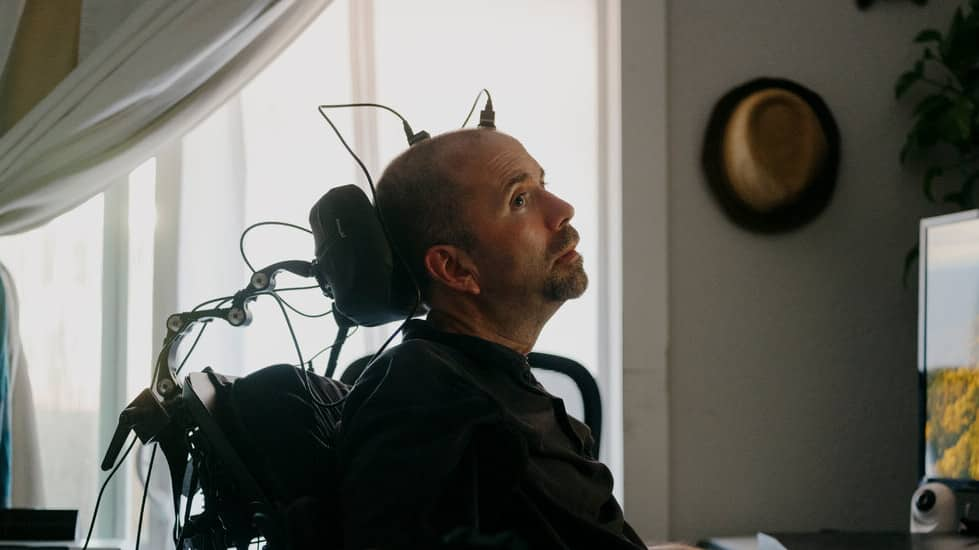
Brain tech breakthrough, AI help ALS patient regain his voice
What's the story
Casey Harrell, a 46-year-old climate activist, has been battling amyotrophic lateral sclerosis (ALS) for the past four years. The disease has gradually robbed him of his physical abilities, including walking and holding his daughter. Most devastatingly, it took away his ability to speak. However, a groundbreaking medical procedure involving a brain chip implant and artificial intelligence (AI) has given Harrell new hope by helping him regain some of his lost speech capabilities.
Medical breakthrough
Pioneering procedure at UC Davis
In July 2023, a team of doctors at the University of California, Davis, performed a pioneering procedure on Harrell. They implanted electrodes into his brain to understand what he was attempting to communicate. This innovative approach is part of a broader scientific endeavor that aims to link human brains with computers, potentially restoring lost faculties. Companies like Elon Musk's Neuralink and Synchron have also shown some promise in this field.
Surgical specifics
Details of the groundbreaking procedure
The surgical team implanted four electrode arrays into Harrell's brain's outer layer, each resembling a tiny bed of nails. This was twice the number recently used in a separate study on an ALS patient. Each array's 64 spikes were designed to detect electric impulses from neurons that activated when Harrell attempted to move his mouth, lips, jaw, and tongue for speech.
AI translation
AI technology translates brain signals into speech
The signals picked up by the electrodes were then fed into a computer running an artificial intelligence program. This program was trained to translate these brain signals into speech. The process involved showing Harrell words on a screen and asking him to imagine saying them, while the computer learned to associate his imagined movements with specific words. The device also spoke those in a voice remarkably like Harrell's, which was created using deepfake technology.
Unexpected results
Procedure's success surpasses expectations
The results of Harrell's procedure were more successful than anticipated, as reported in The New England Journal of Medicine. This breakthrough has set a new standard for implanted speech decoders and highlighted their potential benefits for individuals with speech impairments. Dr. Edward Chang, a neurosurgeon at the University of California, San Francisco, who was not involved in Harrell's case but has developed different speech implants, described the device as "very exciting."
Innovation
The implant and AI system are maintaining over 90% accuracy
The implant rapidly learned to decipher Harrell's speech, achieving 99.6% accuracy on a 50-word vocabulary after minimal training. Within two days, it expanded its repertoire to 125,000 words, correctly interpreting 90% of intended speech and generating original sentences. The key innovation was to implant a higher density of electrode arrays, with pinpoint accuracy, into the brain areas most associated with speech production.
Recovery journey
Harrell's remarkable progress
Over eight months, Harrell produced nearly 6,000 unique words, with the device maintaining a remarkable 97.5% accuracy. This surpassed the performance of many speech-to-text smartphone apps and significantly outpaced previous implant studies, which typically achieved around 75% accuracy, resulting in frequent misinterpretations. Despite some challenges such as the AI system occasionally misinterpreting his thoughts or producing unintelligible sounds, this groundbreaking procedure has given him a renewed sense of hope and independence.